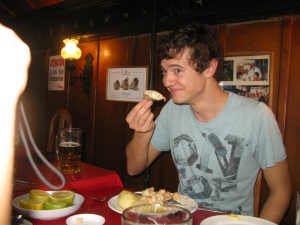The first week of teacher training here in Santiago is done.
It’s gone by so fast, and tomorrow, everyone leaves for their placement towns, scattered across Chile’s 3,000 miles. I knew I was assigned to the Southern region before arriving in Santiago, but it wasn’t until Tuesday when I finally found out my town. I’ll be teaching in Valdivia. With about 140,000 people, it’s known for its large German community, craft breweries, and college-town feel. I’ll be teaching English at a Catholic high school.
I leave on a 12 hour bus ride from Santiago tomorrow night, where I’ll meet my host family at the bus stop. It’s been an intense and amazing week for the group here in Santiago. I’ve grown close with some great people, but some of them have placements thousands of miles away.
Today was our last day in Santiago, and Cami, Marshall, Vanya and I headed to Chile’s Human Rights Memorial Museum, the “Museo de la Memoria y Los Derechos Humanos.” This museum is one of the most moving places I’ve seen in my life. They don’t let you take photos, so everything from this place will be in my memory. The second floor is dedicated entirely to Chile’s two decades of the Augusto Pinochet dictatorship. Thousands of people were killed or went missing during this time. I can write a whole blog about this time period later, since it’s something I’m learning more about.
Today was also March 29th, meaning that bars, businesses and restaurants were closing early. It was the “Day of the Young Combattants.” Every year on this day, Chile’s young people rally in the streets, in commemoration of two brothers who were killed in 1985 under Pinochet’s rule.
It was a very wide-spread caution, as Chilean locals were not making plans to go out tonight and business closed in anticipation of any riots. But since it was last night in Santiago, our group wanted to go have a goodbye drink. But right when we stepped out of the hostel, I noticed the streets had an eerie silence. Nobody was outside. We immediately decided to stay right next to the hostel at a local place we were familiar with.
Everything this week has gone so fast. I can’t believe the next step of this journey starts tomorrow. This past week in Santiago was a safety net of English speakers, but it’s speaking Spanish from here on out. Until next week!


























